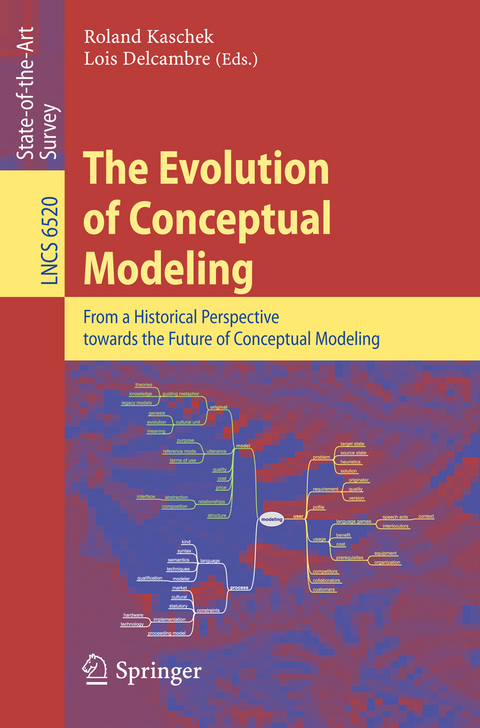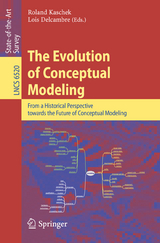The Evolution of Conceptual Modeling
From a Historical Perspective towards the Future of Conceptual Modeling
Seiten
2011
|
2011
Springer Berlin (Verlag)
978-3-642-17504-6 (ISBN)
Springer Berlin (Verlag)
978-3-642-17504-6 (ISBN)
Conceptual modeling represents a recent approach to creating knowledge. It has emerged in response to the computer revolution, which started in the middle of the 20th century.
Computers, in the meantime, have become a major knowledge media. Conceptual modeling provides an answer to the difficulties experienced throughout the development of computer applications and aims at creating effective, reasonably priced, and sharable knowledge about using computers in business. Moreover, it has become evident that conceptual modeling has the potential to exceed the boundaries of business and computer usage.
This state-of-the-art survey originates from the International Seminar on the Evolution of Conceptual Modeling, held in Dagstuhl Castle, Germany, in April 2008. The major objective of this seminar was to look into conceptual modeling from a historical perspective with a view towards the future of conceptual modeling and to achieve a better understanding of conceptual modeling issues in several different domains of discourse, going beyond individual (modeling) projects.
The book contains 14 chapters. These were carefully selected during two rounds of reviewing and improvement from 26 presentations at the seminar and are preceded by a detailed preface providing general insights into the field of conceptual modeling that are not necessarily discussed in any of the chapters but nevertheless aid in conceptualizing the inner structure and coherence of the field. The chapters are grouped into the following three thematic sections: the evolution of conceptual modeling techniques; the extension of conceptual modeling to a service-oriented, peer-to-peer, or Web context; and new directions for conceptual modeling.
Computers, in the meantime, have become a major knowledge media. Conceptual modeling provides an answer to the difficulties experienced throughout the development of computer applications and aims at creating effective, reasonably priced, and sharable knowledge about using computers in business. Moreover, it has become evident that conceptual modeling has the potential to exceed the boundaries of business and computer usage.
This state-of-the-art survey originates from the International Seminar on the Evolution of Conceptual Modeling, held in Dagstuhl Castle, Germany, in April 2008. The major objective of this seminar was to look into conceptual modeling from a historical perspective with a view towards the future of conceptual modeling and to achieve a better understanding of conceptual modeling issues in several different domains of discourse, going beyond individual (modeling) projects.
The book contains 14 chapters. These were carefully selected during two rounds of reviewing and improvement from 26 presentations at the seminar and are preceded by a detailed preface providing general insights into the field of conceptual modeling that are not necessarily discussed in any of the chapters but nevertheless aid in conceptualizing the inner structure and coherence of the field. The chapters are grouped into the following three thematic sections: the evolution of conceptual modeling techniques; the extension of conceptual modeling to a service-oriented, peer-to-peer, or Web context; and new directions for conceptual modeling.
| Erscheint lt. Verlag | 4.2.2011 |
|---|---|
| Reihe/Serie | Information Systems and Applications, incl. Internet/Web, and HCI | Lecture Notes in Computer Science |
| Zusatzinfo | XII, 360 p. 105 illus., 37 illus. in color. |
| Verlagsort | Berlin |
| Sprache | englisch |
| Themenwelt | Informatik ► Datenbanken ► Data Warehouse / Data Mining |
| Schlagworte | algorithms • application exception rules • assurance points • Complexity • data structures • deep instantiation • dynamic process modeling • Event processing • human genome • integration rules • M-objects • ontological metamodeling • Ontology • peer knowledge infrastructure • powertypes • query processing • semanic routing • semantic web • Simulation • web of knowledge |
| ISBN-10 | 3-642-17504-X / 364217504X |
| ISBN-13 | 978-3-642-17504-6 / 9783642175046 |
| Zustand | Neuware |
| Haben Sie eine Frage zum Produkt? |
Mehr entdecken
aus dem Bereich
aus dem Bereich
Datenanalyse für Künstliche Intelligenz
Buch | Softcover (2024)
De Gruyter Oldenbourg (Verlag)
CHF 104,90
Auswertung von Daten mit pandas, NumPy und IPython
Buch | Softcover (2023)
O'Reilly (Verlag)
CHF 62,85




